Huddled together under a purple tarp fashioned into a makeshift tent, a group of more than one hundred Cambodian migrant workers, most exhausted after a gruelling day of travel, shield themselves from the sun.
It’s not a comfortable setting, but it’s become standard protocol as they wait for border authorities at Ou Beichoan – a newly opened, military-controlled point of entry (POE) on the Thai border in Cambodia’s northwestern Banteay Meanchey province.
The migrants here are just some of the latest in an outflow of Cambodian workers from Thailand, who’ve left in droves as job prospects shrivelled across the border with the onset of the Covid-19 pandemic in early 2020.
Crossborder migration has long been a part of life in the rural Cambodian borderlands, where paid work can be scarce. But the well-trodden routes of the past have been redrawn during the pandemic. With the previous thoroughfare of Poipet officially closed to migrants, and confronted by alarmist rumours of intensifying crackdowns by Thai authorities, many returnees are relying on the help of paid brokers to get back home.
In an unfamiliar landscape, these brokers are hired to help migrants circumvent Thai authorities and locate the new and obscure POE in the remote border town of Ou Beichoan. While widespread anecdotal accounts from migrants support the prevalence of broker solicitation, the firm details of these transactions and the journeys they entail remain unconfirmed, said Dum Chanthida, the national project officer at IOM Cambodia.
“There is not in any official news from Thai authorities about this, but it seems like through interviews we have been conducting with some migrants [at Ou Beichoan], they all had the same answer – that they paid the broker to come back,” she said.
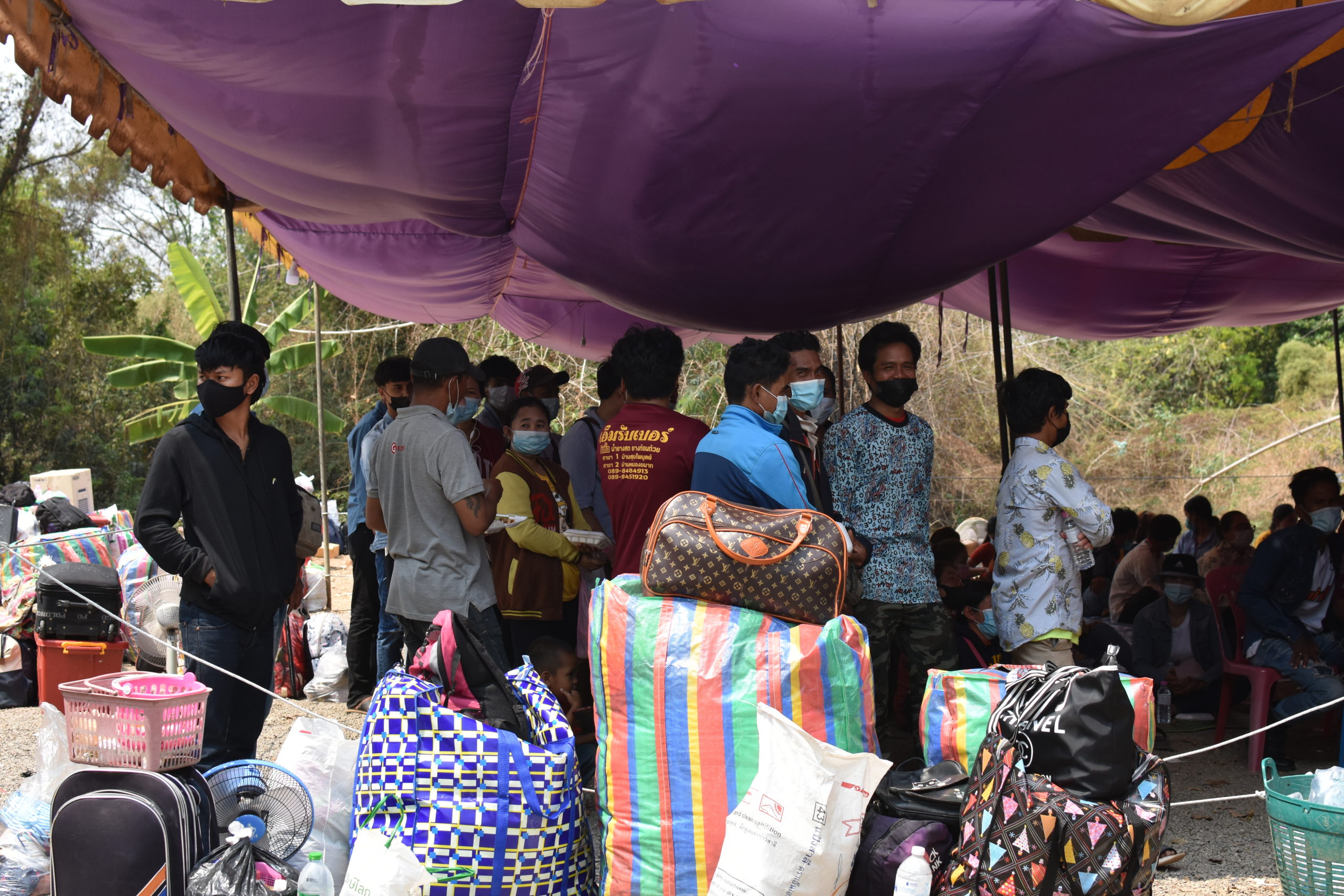
More than its novelty and rurality, Ou Beichoan, dubbed an unofficial POE, is also the only border point in Cambodia under the full jurisdiction of the country’s armed forces.
Unofficial POEs – a status for all border points outside the jurisdiction of the Department of Immigration – have no formal institution and often refer to areas where high levels of illegal cross-border movement are common. In contrast, official POEs like Poipet, the pre-pandemic crossing mecca approximately 35 kilometres south of Ou Beichoan, falls under the management of border police who patrol and oversee verification of all crossers.
At Ou Beichoan, the POE’s unofficial status is derived from its military-based administration, ad hoc usage and lack of formal purpose. In its current iteration it is open only to returning Cambodian migrant workers – all other groups, as well as those crossing into Thailand, are barred.
The station was originally created as an unofficial POE between the Cambodian and Thai militaries, but very few actually know why it was established and how it has been used since, according to IOM’s project and government liaison officer in Cambodia, Phiev Khay.
“I have tried to get all of the details, but no one has been able to provide such information. Even when you talk to people at the national level, some people still mistake Ou Beichoan as an official POE, but it’s not,” Khay said. “What it was created for exactly has not been written down anywhere at all, this is all information that’s been received through word of mouth.”
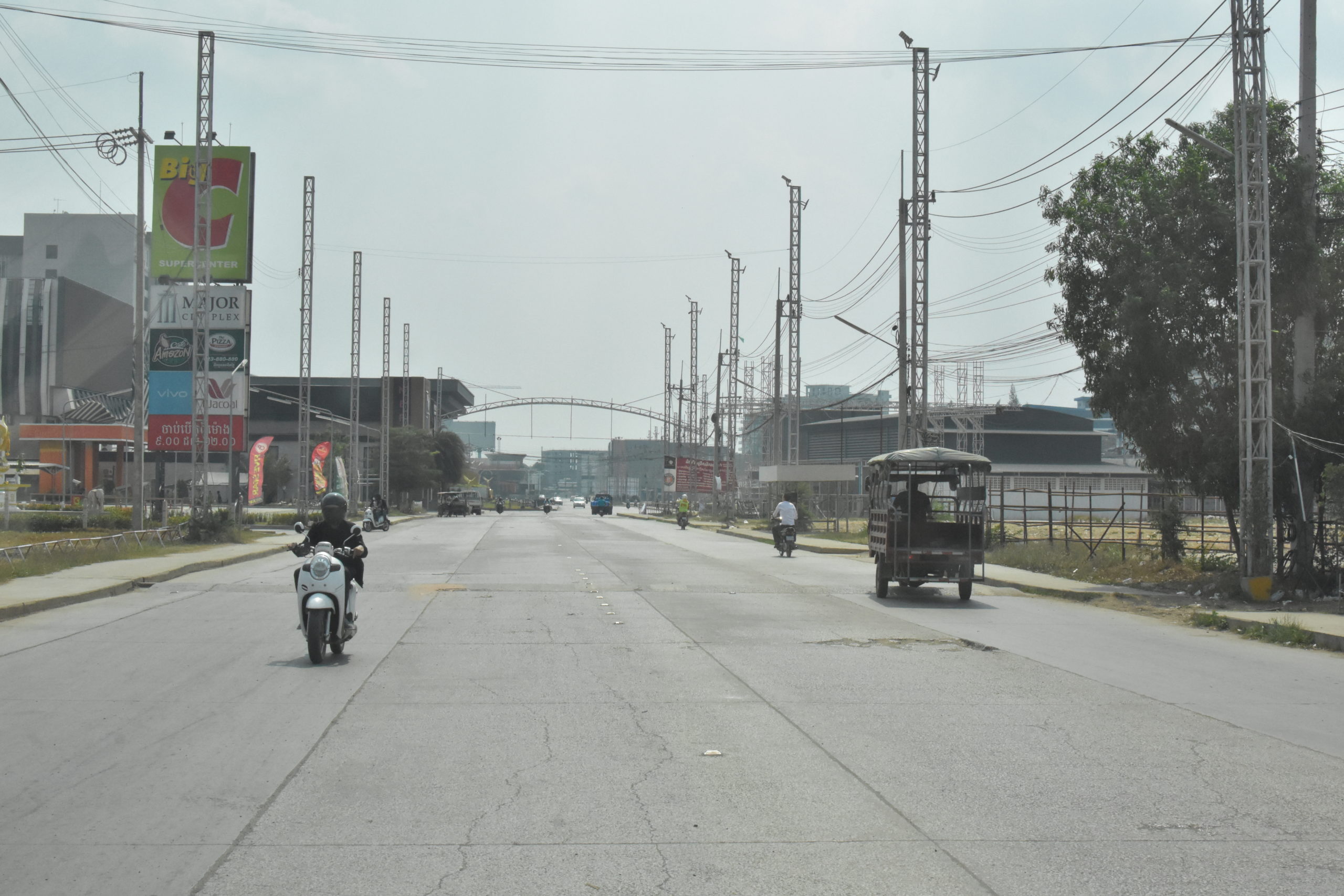
Even the exact timeline of its establishment is tenuous. According to a source in close contact with border officials, who asked to remain anonymous, many high-level Cambodian border authorities believe Ou Beichoan was first instituted in 1979 as an off-the-record passage between the Thai military and the National Army of Democratic Kampuchea (NADK), or the Khmer Rouge, during their resistance to the Vietnamese occupation of Cambodia.
However, Stephen Heder, an American scholar and journalist who visited Cambodia’s border regions during the NADK era, says he never came across a border crossing at Ou Beichoan during his travels.
“There was never any NADK presence in the [Ou Beichoan] area, nor any RTAF [Royal Thai Air Force] arms or other supply deliveries to the anti-Communist forces operating there in 1979, as none of them had RTAF recognition until 1982 or maybe 1983,” Heder said.
Returning to Cambodia in the early 1990s and seeing no signs of an active border crossing in the Ou Beichoan region, Heder is adamant that its establishment must have been after 1993.
Khay explains that the only information that is in fact certain is that, given a founding arrangement between the Thai and Cambodian militaries, Ou Beichoan has, and must always be, administered by personnel from the armed forces.
“Ou Beichoan was created by the militaries of both countries [Thailand and Cambodia] for diplomatic and military relationships, and because it was originally created by the military, that’s why the military is still managing it,” Khay said.
Thai authorities would supply the brokers with information and access to Ou Beichoan and, in exchange, would pocket a portion of the fee given to them for their services
Despite its military jurisdiction, which might suggest a certain level of security, prior to the pandemic, Ou Beichoan had been left relatively unmanned, garnering a reputation as a deregulated border point. Those looking to cross into or out of Cambodia without proper documentation could do so with relative ease, especially with the help of a broker.
According to the same anonymous source, many of the brokers who would frequent Ou Beichoan were hired as part of an informal arrangement with Thai authorities. Thai authorities would supply the brokers with information and access to Ou Beichoan and, in exchange, would pocket a portion of the fee given to them for their services.
However, this alleged activity came to a halt with the onset of the pandemic. Faced with an exodus of Cambodian migrant workers, Thai authorities unilaterally blocked inflows and outflows through Poipet and redirected returnees to Ou Beichoan.
“[Cambodia] had to receive migrants at Ou Beichoan because Thailand informed us that they were planning to send migrants through Ou Beichoan,” says Khay. “Cambodia just moves support resources to wherever migrants are sent.”
In response to the relocation, authorities in Banteay Meanchey, along with development aid agencies, quickly moved resources from Poipet to the obscure border post at Ou Beichoan, leaning on aid workers for help and staffing it with soldiers from the Ministry of National Defense.
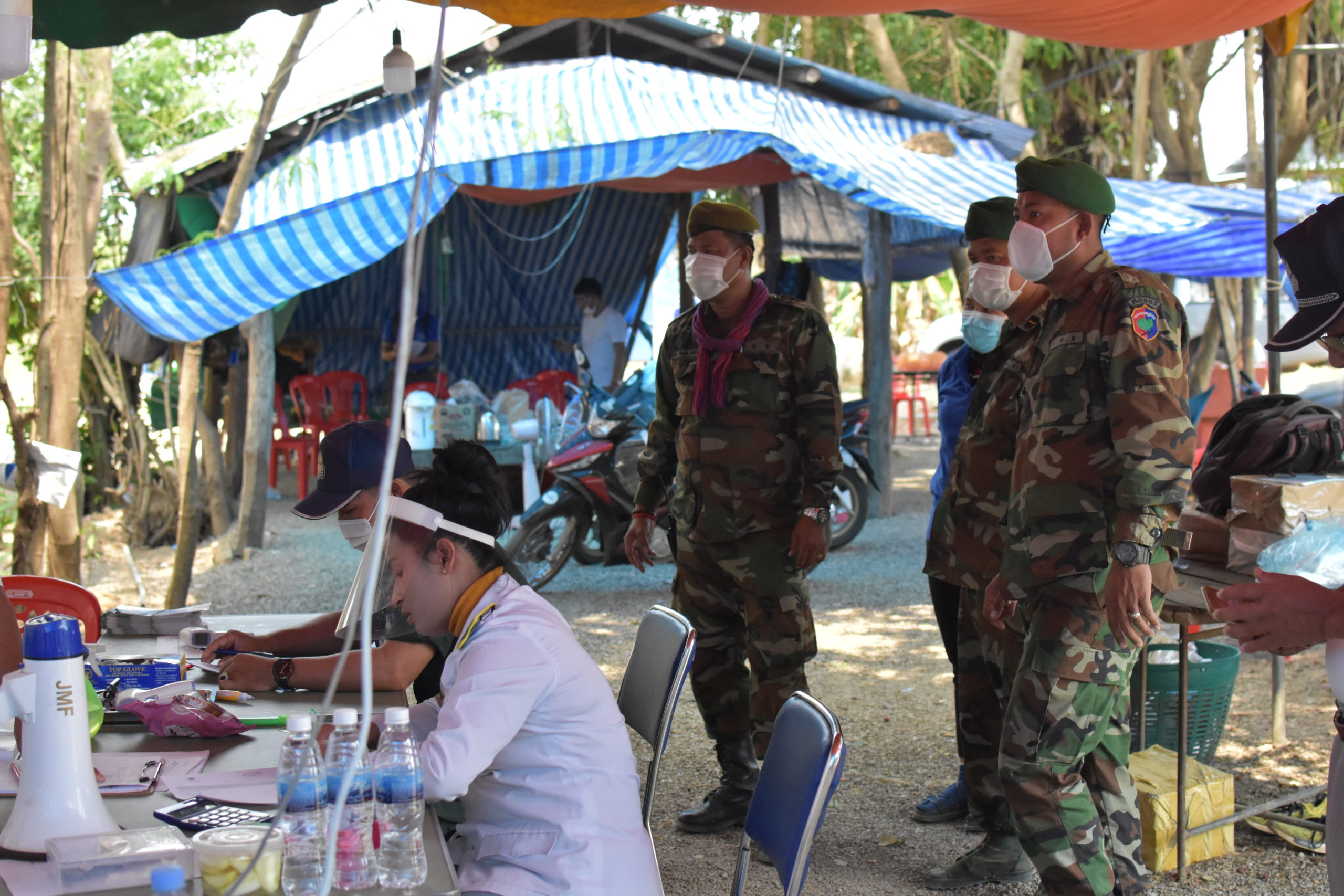
“The government sent many requests to partners, so I was providing support, like clearing the gravel and setting up a WASH [water, sanitation, and hygiene] facility,” said Chanthida.
While the exact reason for Thailand’s decision to redirect repatriation to Ou Beichoan is unknown, it was likely due to its long-standing historical status as a bilateral channel between the two countries, says the anonymous source in close contact with border officials. A representative from Thailand’s Immigration Bureau could not be reached for comment.
Mao Chamnab, a programme officer for migration at the Solidarity Center, explains that Thailand’s redirection, and Cambodia’s rapid response, could have also been motivated by the pandemic. Both Thailand and Cambodia were likely aware of the frequency of unofficial border crossings in and around Ou Beichoan, and were eager to prevent undocumented cross-border movement amidst the pandemic to mitigate the spread of Covid-19.
“Ou Beichoan is a small border where many migrants decide to cross, especially undocumented migrant workers,” Chamnab said. “Now, there is a new agreement between the Thai and Cambodian authorities that migrants will only cross at Ou Beichoan. They will no longer send migrants to cross at international borders [like Poipet] to prevent the Covid-19 pandemic.”
Chanthida similarly speculates that it was likely an effort to focus resources and personnel in Banteay Meanchey.
“With a leaking [of migrants] through many open gates, it’s challenging for partners to provide support. So, it was suggested to have only one gate [in Banteay Meanchey] to receive migrants.”
According to unpublished data collected by the IOM in January, since the pandemic began, 150-200 migrants pass through Ou Beichoan on an average day – making it one of the busiest POEs in Cambodia, along with Osmach in neighbouring Oddar Meanchey.
With little known about Ou Beichoan, those who make it to the inconspicuous crossing often do so under the advice of relatives who have come through before, or more commonly the guidance of paid brokers, familiar with the POE as a former smuggling route.
This solicitation of brokers, unusual for legal border crossings, grew as rumours circulated about Thai authorities cracking down on repatriation in an effort to stifle the outflow of labour.
Since March 2020, nearly 140,000 Cambodian workers have returned home from Thailand, out of a total documented 650,000 in the country. This has dealt a significant blow to Thailand’s migrant-dependent economy, now facing its greatest contraction since 1997.
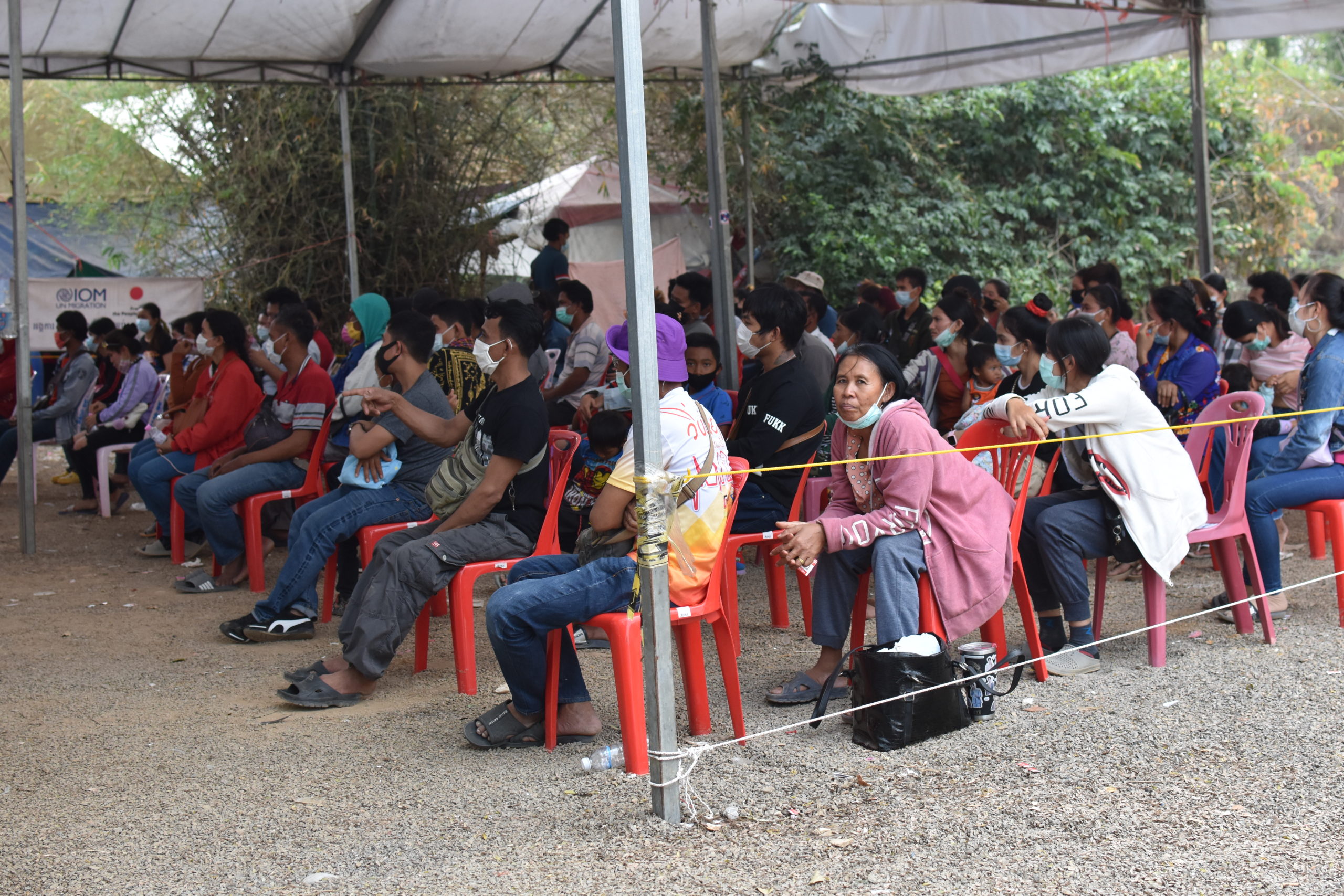
With widespread fears of further economic collapse, many of the migrant workers at the Ou Beichoan border told the Globe that they heard accounts of Khmer workers being stopped at Thai border checkpoints and blocked from reentering Cambodia, and they were nervous that the same could happen to them.
“I thought that maybe someone will follow us when we try to go to our village. Like, the [Thai] military will find us and catch us,” said an anonymous 39-year old female migrant worker who had previously been working in a shop in Bangkok.
While stories like these are common, Khay believes that rumours of these crackdowns are likely untrue, fabricated by brokers intent on scaring migrants into using their services – especially now with illegal smuggling no longer viable through Ou Beichoan.
“It does not sound logical. Migrants would not return home if they had jobs in Thailand and what is the point of keeping them [in Thailand] if there are no jobs for them?” said Khay. “They are told by brokers that the border is closed and only they [brokers] know where to take them to cross the border.”
A February 22 report of deported Cambodian migrant workers, expelled from Thailand amid new Covid-19 restrictions, lends credence to the likelihood that these stories are, in fact, only rumours.
But stricken by panic, and unable to verify the validity of the hearsay, many migrants choose safety over frugality and find a way to pay for a broker – even if it means delving into hard-earned savings. Most brokers charge roughly 3000 Thai baht ($100), even for legal crossings. That sum is nearly an entire month’s earnings for most migrant workers who, as of 2019, average an annual income of $1228.
At least he doesn’t cry. It made the travels much easier. I’m very lucky for this
For many migrants, prior to Covid-19 the thought of paying a broker to re-enter their own country legally would have been absurd. However with rumours circulating, many feel they don’t have a choice – especially those who are travelling with family born in Thailand.
A 25-year-old new mother, making the crossing alone with her eight-month-old son, explains that her baby was born in Thailand and, as a result, doesn’t yet have Cambodian documents. While she has a Cambodian passport, given the prevalence of the crackdown rumours she was scared that, without a broker, her baby would be stopped or even taken from her by the authorities as she tried to cross back.
“At least he doesn’t cry,” the new mother said through a translator, cradling her son. “It made the travels much easier. I’m very lucky for this.”
As she spoke, her eyes darted around before she tentatively pulled up her shirt to breastfeed her newborn baby. No privacy is accorded to migrants at Ou Beichoan as they await processing and registration.
“I came back to Cambodia to keep my baby with his grandparents, but I want to go back to Thailand when it is possible because my husband is still there,” she said.
For most migrants, returning to Cambodia is a temporary solution to cope with the Covid-19 economic fallout. Faced with business closures in Thailand, they believe there to be greater employment opportunities in Cambodia, and also wish to be reunited with their families back home.
The 39-year old migrant from Bangkok explains that she had been prepared to stay in Thailand to ride out the crisis, but now that she has a job opportunity in Cambodia, she wanted to return home to be with her husband.
“It’s harvest season now so I wanted to come back to help and support my husband who works in the rice harvest,” she said. “In Thailand I was working at a store, selling things in Bangkok, but now he needs my help here so I came back.”
While she is one of the fortunate ones, having a secure job waiting for her in Cambodia, most migrants, once settled back in their communities, are faced with a similar deficit in job opportunities as Cambodia also grapples with a pandemic-riddled economy.
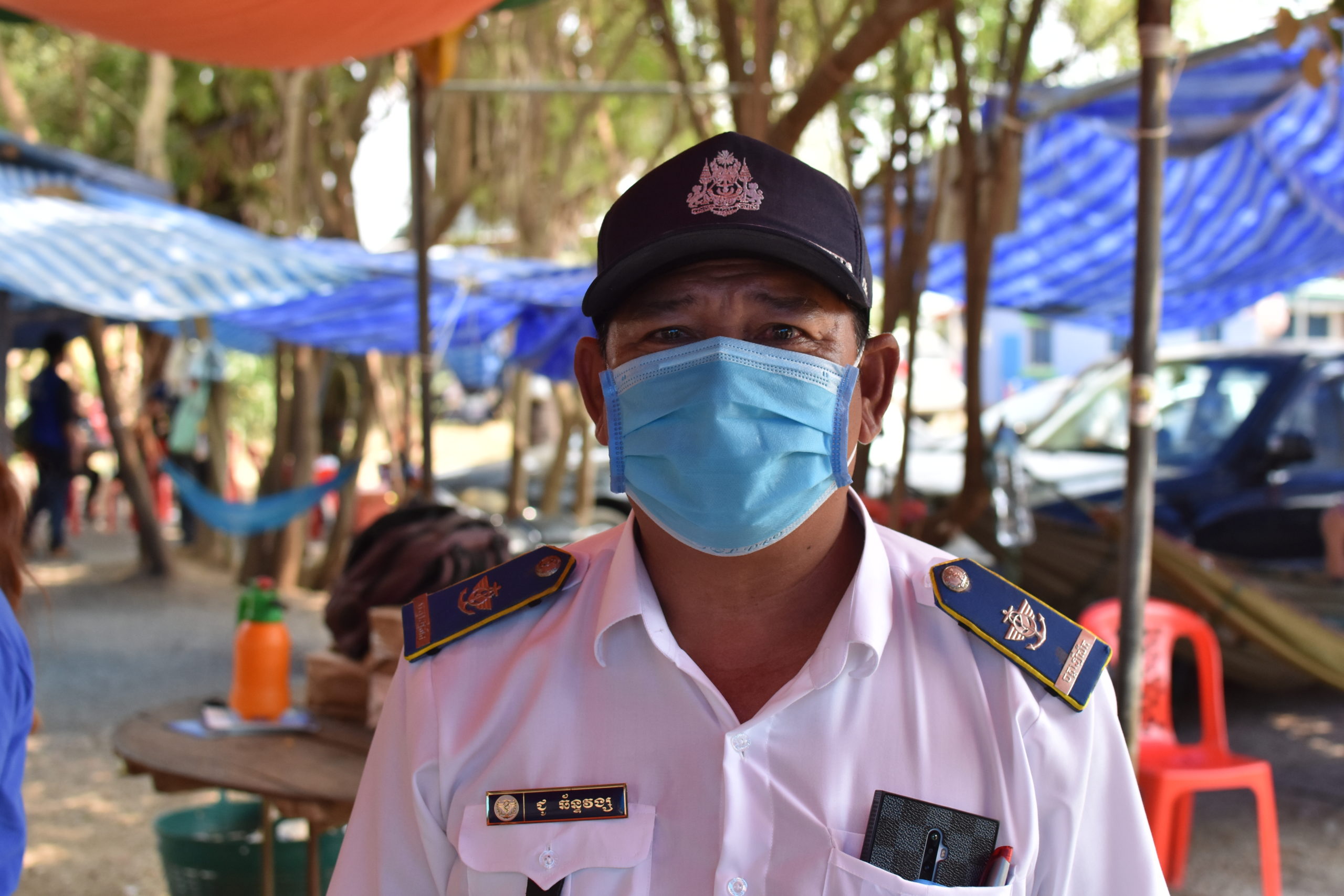
Although Ou Beichoan is administered by the armed forces, besides the presence of soldiers and the transient infrastructure, the daily operations at this POE do not differ much from those at other border crossings in the country.
“If you compare Ou Beichoan with Osmach [in Oddar Meanchey], for instance, there are more staff [in Osmach] but you have the same process, the same [Covid-19] screening, registration, and delivery of hygiene kits and food packages,” says Jonás Crodova Gomes, a shelter and WASH specialist with IOM Cambodia.
When the migrants first enter Cambodia and arrive at the Covid-19 screening checkpoint in Ou Beichoan, they are told to leave their belongings in a designated area and take a seat under a nearby tarp. After taking a seat, they are divided into groups based on their province to ensure that they are sent to quarantine centres near their communities.
Once sectioned off, a group will be ushered into the second tent for their Covid-19 screening. Due to limited finances, returning migrants at Ou Beichoan are not administered proper Covid-19 tests. Instead, they’re called up in groups of four for temperature checks.
As the returning migrants wait in the second tent, they are seated in equidistant rows of chairs as part of social distancing efforts. Despite being Cambodian citizens, the scene bears similarities to refugees waiting to file asylum in foreign countries.
Behind a wall of info-banners sit two health professionals sent from the Cambodian Ministry of Health, as well as personnel from the Ministry of Defense – the two units work together to register returning migrants.
The border personnel at Ou Beichoan are on duty 24 hours a day, ready to process migrants arriving at all hours of the night. Healthcare workers take shifts, going home after a long day, as each hospital in the surrounding area is responsible for sending one person each day on a rotating schedule.
Despite the border regions of Banteay Meanchey being a Covid-19 hotspot, Chan Vong – a healthcare worker from Ou Beichoan Health Center, and one of the first staff to arrive at the POE when it opened in March 2020 – explains that they haven’t yet needed to bring in personnel from other parts of the country.
“Government officials from source provinces like Siem Reap will come, but only to collect their people and send for quarantine at their province,” he said through a translator. “Everyone here is from Banteay Meanchey, and right now the rotational shifts are enough.”
When I heard information like this, it made me feel so scared, to be stuck in a centre like that for so long
Once border authorities complete their registration and screening, the migrants collect their belongings and make their way over to a military transporter that will take them to their designated quarantine facility. Herded into the crowded trucks along with their belongings, the newly returned migrants are shuttled to one of many different quarantine centres across the country, which, due to high demand, have come to include repurposed high schools and decrepit hospitals.
Given the expedient construction of many of these new quarantine centres, migrants recount hearing stories about the “unpleasant” and “suffocating” conditions within the Cambodian centres during the mandatory 14-day stay.
However, with few alternatives, most returning workers quash these fears. For those at Ou Beichoan, this means facing the uncertainty of the new border crossing, and a two-week confinement in an unknown facility.
“Some of my relatives came back to Cambodia before me, and they were sent to quarantine centres. They informed me that when I arrive I would have to stay in a centre for 14 days,” said the 39-year-old former shopkeeper.
“When I heard information like this, it made me feel so scared, to be stuck in a centre like that for so long.”


